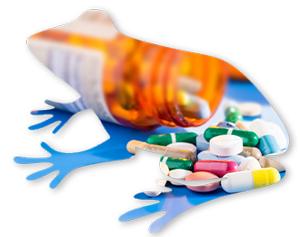
Pharmaceuticals and Personal Care Products (PPCPs) are an environmental health concern. According to EPA, PPCPs are increasingly being detected at low levels in surface water and there is a concern that these compounds may have an impact on aquatic life.
What Are PPCPs?
Pharmaceuticals are drugs taken to treat illnesses, diseases, and medical conditions in both humans and animals. Pharmaceuticals consist of many classes and types, including antidepressants, tranquilizers, psychiatric drugs, cancer (chemotherapy) drugs, painkillers, anti-inflammatories, antihypertensives (e.g., blood pressure medications), antiseptics, lipid regulators (e.g., cholesterol medication), oral contraceptives, synthetic hormones, antibiotics, performance-enhancing drugs (e.g., Viagra), dermatology drugs (e.g., topical for acne, eczema, psoriasis, antifungals, steroids).
Personal care products are used for self-care and hygiene and can include a wide variety of chemical compounds. Some examples of personal care products are perfumes, musks, shampoos, deodorants, hair dyes, oral hygiene products, hair sprays, makeup, nail polish, sunscreens, body lotions, lipsticks, and creams.
PPCPs in the Environment
Pharmaceuticals and personal care products are either excreted as waste or are rinsed from our bodies and washed down drains, into sewer systems, and often pass through treatment into the environment.
Wastewater treatment facilities are not designed to remove PPCPs from wastewater. Many PPCPs have persistent chemicals and compounds that remain biologically active after they leave the body or are disposed of in landfills and waters. Hospitals, doctors offices, veterinary clinics, farms, ranches, and average homes are continual sources of PCPPs. We all contribute to putting PPCPs in the environment.
Environmental Effects
PPCPs are of concern for potential ecological and environmental impacts because they may be active at extremely low concentrations, are widespread and continuously released in large quantities, have unpredictable biochemical interactions when mixed, and at times may concentrate in the food chain and especially affect aquatic organisms.
Some of the known potential impacts on organisms include delayed development in fish, delayed metamorphosis in frogs, and a variety of reactions including altered behavior and reproduction.
Help Reduce PPCP Concerns
- Research the products you purchase
- Reduce your use
- Don’t buy in bulk
- Choose unscented and biodegradable products
- Avoid antibiotic ingredients
- Properly dispose of PPCPs
- Never flush unused portions down the toilet
- Seal in a container and throw in the garbage
- Utilize local medication disposal mechanisms:
- Cobb County hosts spring & fall medication disposal events
- Marietta Police Department has a 24/7 drug dropbox
- PPCP fact sheet (above) provides disposal information
